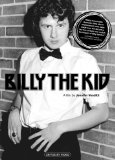| Reviews & Columns |
|
Reviews DVD TV on DVD Blu-ray 4K UHD International DVDs In Theaters Reviews by Studio Video Games Features Collector Series DVDs Easter Egg Database Interviews DVD Talk Radio Feature Articles Columns Anime Talk DVD Savant Horror DVDs The M.O.D. Squad Art House HD Talk Silent DVD
|
DVD Talk Forum |
|
|
| Resources |
|
DVD Price Search Customer Service #'s RCE Info Links |
|
Columns
|
|
|
Billy the Kid
As a toddler, Billy broke his mother's nose during a tantrum. At age five, a physician at Boston Children's Hospital predicted he would need to be institutionalized. Now at fifteen, Billy is physically awkward, peculiarly loquacious, obsessive, and emotionally immature.
Despite having a supportive mom who is also his best friend, Billy's home life hasn't been ideal. Though Billy hasn't had any contact with his biological father in years, he's still troubled by memories of him beating his mother. Billy loves and admires his stepfather, but suffers when the step-dad leaves to take a job in Florida because "he can't stand the cold winters in Maine."
Billy loves movies and frequently quotes the likes of The Terminator, The Karate Kid, Highlander, and Rocky, though slasher films are his favorite. He's an avid reader and collector of trivia about serial and spree killers, a martial arts purple belt, and a devoted fan of AC/DC, Kiss and the Broadway musical Cats. Billy hopes to use this documentary to parlay fame as an actor, but he's also considering being a radio DJ and rock star. However, his more immediate goals are to learn to balance a checkbook, cook for himself, and maybe be cast as a vigilante in his next film.
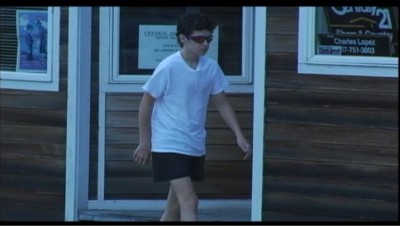
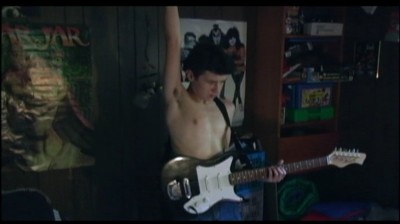
Filmed on five sequential days at the beginning of the 2006 school year and three days that winter, Billy the Kid consists of a series of vérité vignettes with Billy interspersed with interviews with his mother. Many of the vignettes consist of Billy silently doing some mundane activity like walking the halls of his small town high school, riding a bike around town, playing an arcade game, or staring out the window, over which separately recorded monologues from Billy are laid.
Billy, ever the movie buff, decides his story needs romance so he crafts his own principal set piece for Billy the Kid, the wooing of a "damsel in distress." Billy sets his sights on a shy, nearly blind, sixteen-year-old Heather whose eyes dart incessantly from side to side marking her as a fellow outsider. Heather works in her family's diner but hopes one day to become a professional wrestler.
On the second day of shooting, with film crew in tow, Billy introduces himself to his would be leading lady at the diner and undertakes a rapid courtship. On day one of the whirlwind romance, Billy meets and chats up Heather, and falls deeply, madly and sincerely in love. On day two, he slides his arm around her. On day three, they agree to be go out, he professes his love, and they kiss. On day four, Heather breaks up with Billy and he's utterly devastated. So ends the romance and the first five days of principal shooting.
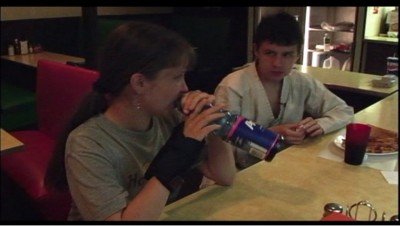
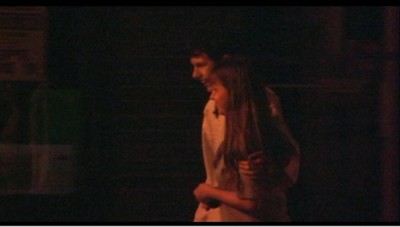
The film crew returns in the winter for three more days of vignettes crafted by Billy and filmmaker Jennifer Venoitti. Among these, Billy parleys the presence of the film crew into a seat at the cool kids table in the lunchroom, and persuades the girls in the school choir to sing a Kiss ballad with him in the hallway.
Billy the Kid works as a film that straddles the line between the geek-comedy fiction of Napoleon Dynamite and the non-fiction portrait of troubled adolescence captured masterfully in David Sutherland's Country Boys. Regardless of how thoroughly Billy and Venoitti have constructed the drama, it remains easy to sympathize with Billy, laugh along with his antics, and wish him the best while still wincing at his missteps.
Following filming of Billy the Kid, Billy's condition was diagnosed as Asperger syndrome, a form of autism. Though Billy the Kid initially appeared on the festival circuit with a closing intertitle revealing his diagnosis, Venoitti later removed it. In the extras she explains she did this because she didn't want to make a documentary about a medical condition; she wanted viewers to see Billy unmediated by a label.
Presentation
Video:
The anamorphically enhanced widescreen (1.85:1) transfer reveals the limitations of the DV source material. Shot handheld using natural light, Billy the Kid frequently looks far from ideal with poor focus, shot composition and lighting. There's also motion blur, mild aliasing, and inconsistent color levels. Nevertheless, these are the kinds of flaws one expects from cinéma vérité and thus they don't overly diminish the film.
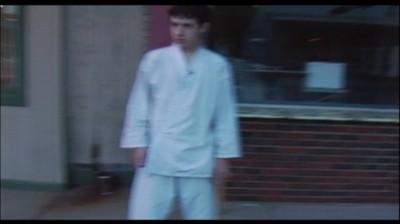
Audio:
As with the video, the 2.0 DD audio reveals the limitations of the cinéma vérité format with some dialogue so indistinct that forced subtitles are provided. In addition to these, optional English subtitles for the hearing impaired are also provided. Only the soundtrack makes much use of the stereo sound.
Extras:
The extras include a feature-length commentary with director Jennifer Venditti and actor Ryan Gosling (Half Nelson). Gosling doesn't have any formal connection with the film, but appears to be a close friend of Venditti's and a fan of Billy's. In a separately recorded disclaimer, Venditti reveals that she's ambivalent about DVD commentaries because she thinks films should stand on their own. This ambivalence is apparent throughout the commentary as she doesn't say much, while most of Gosling's infrequent comments are limited to how cool he thinks Billy is. Accordingly, I'd suggest skipping the commentary.
Far more informative is the interview with the director (23:30) in which Venditti discusses finding Billy, shooting, Billy's diagnosis and the film's critical reception.
Additional extras include a short entitled Pieces That Don't Fit (22:35) which features deleted scenes and, most notably, footage shot with Billy one year after Billy the Kid's completion. Eight songs from the soundtrack are also included in their entirety, and finally there's the theatrical trailer.
Final Thoughts:
Under the best of circumstances navigating adolescence isn't easy, but it's especially difficult for misfits like Billy Price. Watching Billy the Kid one cannot help but to root for its protagonist. Though only slightly less manufactured than reality TV, this cinéma vérité documentary about a sweet kid in a tough situation is recommended.
|
| Popular Reviews |
| Sponsored Links |
|
|
| Sponsored Links |
|
|
| Release List | Reviews | Shop | Newsletter | Forum | DVD Giveaways | Blu-Ray | Advertise |
|
Copyright 2024 DVDTalk.com All Rights Reserved. Legal Info, Privacy Policy, Terms of Use,
Manage Preferences,
Your Privacy Choices | |||||||









